Background
Stanley James Grenz was born on January 7, 1950, in Alpena, Michigan, United States.

1201 Larimer St, Denver, CO 80204, USA
University of Colorado
6399 S Santa Fe Dr, Littleton, CO 80120, USA
Denver Conservative Baptist Seminary
Geschwister-Scholl-Platz 1, 80539 München, Germany
University of Munich
Denver, Colorado, United States
Northwest Baptist Church
162 Rowandale Ave, Winnipeg, MB R2K 0A5, Canada
Rowandale Baptist Church
515 Portage Ave, Winnipeg, MB R3B 2E9, Canada
University of Winnipeg
2100 S Summit Ave, Sioux Falls, SD 57105, USA
North American Baptist Seminary
5920 Iona Dr, Vancouver, BC V6T 1J6, Canada
Carey Theological College
1301 S University Parks Dr, Waco, TX 76706, USA
Baylor University
2501 Elliott Ave, Seattle, WA 98121, USA
Mars Hill Graduate School











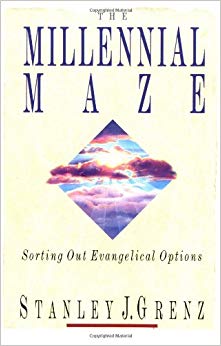
(Jesus is coming back! On this issue Evangelicals are unit...)
Jesus is coming back! On this issue Evangelicals are united. But ask, "When will he return? Before or after the millennium? What will the millennium be like? What exactly is our hope?" and you enter a bewildering maze of options all claiming to be the right one. In this book Stanley J. Grenz provides historical and biblical, as well as theological, perspective on the four major positions held by evangelicals--postmillennialism, dispensational premillennialism, historic premillennialism and amillennialism. Assessing the strengths and weaknesses of each position, he seeks to cut a new path through the maze that reaffirms the valid insights of each and sounds a fresh note of hope in an age of shattered illusions. As an added bonus readers will find that Grenz takes note of some of the latest development in dialog between dispensationalists and covenant theologians. The result has been some modifications in long-held positions that have brought the two groups closer together.
https://www.amazon.com/gp/product/0830817573/?tag=2022091-20
1992
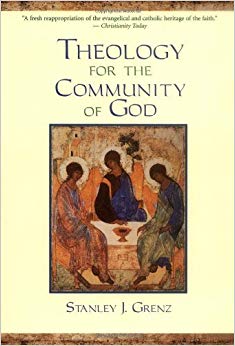
(This proven systematic theology represents the very best ...)
This proven systematic theology represents the very best in evangelical theology. Stanley Grenz presents the traditional themes of Christian doctrine -- God, humankind, Christ, the Holy Spirit, the church, and the last things--all within an emphasis on God's central program for creation, namely, the establishment of community. Masterfully blending biblical, historical, and contemporary concerns, Grenz's respected work provides a coherent vision of the faith that is both intellectually satisfying and expressible in Christian living. Available for the first time in paperback. This proven systematic theology represents the very best in evangelical theology. Stanley Grenz presents the traditional themes of Christian doctrine -- God, humankind, Christ, the Holy Spirit, the church, and the last things--all within an emphasis on God's central program for creation, namely, the establishment of community. Masterfully blending biblical, historical, and contemporary concerns, Grenz's respected work provides a coherent vision of the faith that is both intellectually satisfying and expressible in Christian living. Available for the first time in paperback.
https://www.amazon.com/gp/product/B001E972Y8/?tag=2022091-20
1994
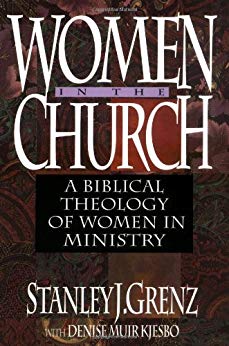
(Studies of key biblical passages on women's roles in the ...)
Studies of key biblical passages on women's roles in the church fill entire bookshelves, if not libraries. But in Women in the Church, Stanley Grenz and Denise Muir Kjesbo offer the first in-depth theological study of this issue--one of the most bitterly contested issues of our day. Carefully considering the biblical, historical and practical concerns surrounding women and the ordained ministry, this book will enlighten people on all sides of the issue. But Grenz and Kjesbo make no secret of their bold conclusion: 'Historical, biblical and theological considerations converge not only in allowing, but also in insisting, that women serve as full partners with men.' Thorough and irenic, Women in the Church bids to take an intense discussion to a new plane.
https://www.amazon.com/gp/product/B0023B2GC4/?tag=2022091-20
1995
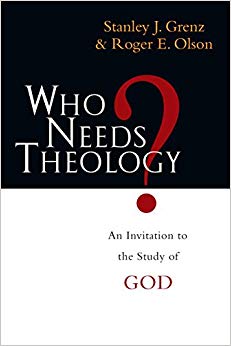
(To many Christians theology is something alien, overly in...)
To many Christians theology is something alien, overly intellectual and wholly unappealing. Even seminary students are known to balk at the prospect of a course on theology. Yet theology--most simply, the knowledge of God--is essential to the life and health of the church. In this short introduction, Stanley Grenz and Roger Olson, two theologians who care deeply about the witness of ordinary Christians and the ministry of the church, show what theology is, what tools theology uses, why every believer (advanced degrees or not) is a theologian and how the theological enterprise can be productive and satisfying. Their clear, easily understood book is ideal for students, church study groups and individual Christians who want to strengthen understanding, belief and commitment by coming to know God more fully.
https://www.amazon.com/gp/product/B0028N5UOS/?tag=2022091-20
1996
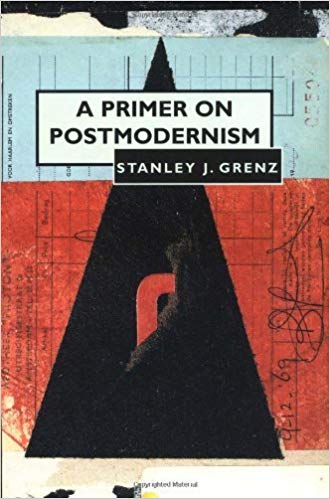
(From the academy to pop culture, our society is in the th...)
From the academy to pop culture, our society is in the throes of change rivaling the birth of modernity out of the decay of the Middle Ages. We are now moving from the modern to the postmodern era. But what is postmodernism? How did it arise? What characterizes the postmodern ethos? What is the postmodern mind and how does it differ from the modern mind? Who are its leading advocates? Most important of all, what challenges does this cultural shift present to the church, which must proclaim the gospel to the emerging postmodern generation? Stanley Grenz here charts the postmodern landscape. He shows the threads that link art and architecture, philosophy and fiction, literary theory and television. He shows how the postmodern phenomenon has actually been in the making for a century and then introduces readers to the gurus of the postmodern mind-set. What he offers here is truly an indispensable guide for understanding today's culture. From the academy to pop culture, our society is in the throes of change rivaling the birth of modernity out of the decay of the Middle Ages. We are now moving from the modern to the postmodern era. But what is postmodernism? How did it arise? What characterizes the postmodern ethos? What is the postmodern mind and how does it differ from the modern mind? Who are its leading advocates? Most important of all, what challenges does this cultural shift present to the church, which must proclaim the gospel to the emerging postmodern generation? Stanley Grenz here charts the postmodern landscape. He shows the threads that link art and architecture, philosophy and fiction, literary theory and television. He shows how the postmodern phenomenon has actually been in the making for a century and then introduces readers to the gurus of the postmodern mind-set. What he offers here is truly an indispensable guide for understanding today's culture.
https://www.amazon.com/gp/product/B001OCEJKK/?tag=2022091-20
1996

(Sexual misconduct by clergy is a devastating issue that r...)
Sexual misconduct by clergy is a devastating issue that reaches across all denominations, damaging the credibility of the church in its wake. The media regularly reports on the moral failure of leaders and abuse at the hands of those who are supposed to be trustworthy. Betrayal of Trust focuses on a common scenario of abuse--sexual involvement between a male pastor and a female congregant--and offers practical solutions on how to respond to and prevent this betrayal of trust. This book presents methods that will help churches respond sensitively to victims and implement policies and procedures to prevent abuse from taking place. For clergy who may be at risk for this behavior, it offers help in establishing appropriate boundaries. This second edition includes a new chapter that offers help for the wandering pastor and a risk-determination questionnaire for pastors who may become abusers.
https://www.amazon.com/gp/product/B0071088CO/?tag=2022091-20
2000
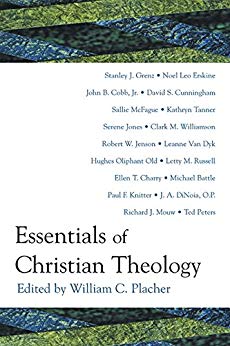
(This splendid introductory textbook for Christian theolog...)
This splendid introductory textbook for Christian theology presents two essays by leading scholars on each of the major theological questions. William Placher provides an excellent discussion of the history and current state of each doctrine while the essays explore the key elements and contemporary issues relating to these important theological concepts.
https://www.amazon.com/gp/product/B00SLHGT5O/?tag=2022091-20
2003
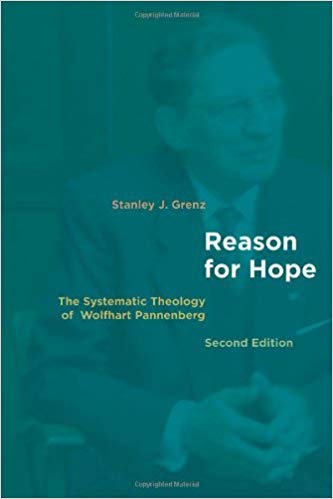
(First associated in the 1960s with the “theology of hope,...)
First associated in the 1960s with the “theology of hope,” German scholar Wolfhart Pannenberg has since become a major interdisciplinary thinker and a highly respected voice in the theological community. In Reason for Hope Stanley Grenz, a former student of Pannenberg and a noted theologian himself, provides a valuable, complete exposition of Pannenberg’s Systematic Theology. The book examines Pannenberg’s dogmatics in the context of his other works, particularly those in English, while also providing an up-to-date overview of the ongoing debate over his writings. Following the flow of Pannenberg’s Systematic Theology, it devotes a chapter each to his theological approach, doctrine of God, doctrine of creation and humanity, Christology, ecclesiology, and eschatology, showing why Pannenberg’s theology may be seen as a grand attempt “to give reason for the hope” that he has in Christ (1 Peter 3:15). Those wishing to become acquainted with Pannenberg’s magisterial work will find no better place to start than Grenz’s Reason for Hope. First associated in the 1960s with the “theology of hope,” German scholar Wolfhart Pannenberg has since become a major interdisciplinary thinker and a highly respected voice in the theological community. In Reason for Hope Stanley Grenz, a former student of Pannenberg and a noted theologian himself, provides a valuable, complete exposition of Pannenberg’s Systematic Theology. The book examines Pannenberg’s dogmatics in the context of his other works, particularly those in English, while also providing an up-to-date overview of the ongoing debate over his writings. Following the flow of Pannenberg’s Systematic Theology, it devotes a chapter each to his theological approach, doctrine of God, doctrine of creation and humanity, Christology, ecclesiology, and eschatology, showing why Pannenberg’s theology may be seen as a grand attempt “to give reason for the hope” that he has in Christ (1 Peter 3:15). Those wishing to become acquainted with Pannenberg’s magisterial work will find no better place to start than Grenz’s Reason for Hope.
https://www.amazon.com/gp/product/B0049ENDIE/?tag=2022091-20
2005
educator ethicist theologian author
Stanley James Grenz was born on January 7, 1950, in Alpena, Michigan, United States.
Grenz graduated from the University of Colorado with a bachelor's degree in 1973. He then obtained his Master of Divinity degree at Denver Conservative Baptist Seminary (with honours) in 1976 and a doctorate at the University of Munich (magna cum laude) in 1980.
Grenz was ordained to the pastoral ministry in 1976 and started his career, working within the local church context as youth director and assistant pastor (Northwest Baptist Church in Denver, from 1971 to 1976), pastor (Rowandale Baptist Church, Winnipeg, from 1979 to 1981), and interim pastor on several occasions. He served on many Baptist boards and agencies and also as a consulting editor of Christianity Today.
While in the pastorate, Grenz taught courses both at the University of Winnipeg and at Winnipeg Theological Seminary (now Providence Seminary). He served as Professor of Systematic Theology and Christian Ethics at the North American Baptist Seminary, Sioux Falls, South Dakota from 1981–1990.
For twelve years till 2002, Grenz held the position of Pioneer McDonald Professor of Baptist Heritage, Theology and Ethics at Carey Theological College and at Regent College in Vancouver. After a one-year sojourn as Distinguished Professor of Theology at Baylor University and George W. Truett Theological Seminary in Waco, Texas (2002–2003), he returned to Carey in August 2003 to resume his duties as Pioneer McDonald Professor of Theology.
From 1996 to 1999 Grenz also carried an appointment as Professor of Theology and Ethics at Northern Baptist Theological Seminary in Lombard, Illinois.
In the fall of 2004, he assumed an appointment as Professor of Theological Studies at Mars Hill Graduate School in Seattle, Washington.
Grenz' primary contributions were made discussing how evangelical Christianity ought to relate to the world. He wrote on a wide range of subjects, from sexuality to history to basic apologetics, and was one of North America's leading evangelical voices in the late 20th century and early 21st century.
(First associated in the 1960s with the “theology of hope,...)
2005(This splendid introductory textbook for Christian theolog...)
2003(Sexual misconduct by clergy is a devastating issue that r...)
2000(From the academy to pop culture, our society is in the th...)
1996(Studies of key biblical passages on women's roles in the ...)
1995(To many Christians theology is something alien, overly in...)
1996(This proven systematic theology represents the very best ...)
1994(Jesus is coming back! On this issue Evangelicals are unit...)
1992Grenz was a member of the Baptist World Alliance, Canadian Evangelical Theological Association, Evangelical Fellowship of Canada, American Academy of Religion, National Association of Baptist Professors of Religion and Phi Beta Kappa.
Grenz was married to Edna Sturhahn. The couple had 2 children: Joel and Corina.
